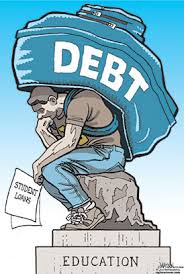
Providers are often surprised to learn that a person can be excluded from participation in federal health care programs because of student loan default. In fact, the failure to repay student loans is one of the most common reasons people find themselves on an exclusion list.1
I. Federal Regulations Surrounding Student Loan Default & Exclusions
The Office of the Inspector General (OIG) makes it clear that if a provider fails to repay a Health Education Assistance Loan (HEAL), he or she can be excluded. The federal government, however, has not issued any new HEALs since 1998.2 Coincidentally, most providers who received Health Education and Assistance Loans between 1978 and 1998 are still practicing today. As of April 20, 2014, 846 HEAL borrowers were in default. Therefore, they were all excluded from the Federal health care programs. Together, these 846 borrowers owed over $1.4 million to the federal government. Indeed, some HEAL borrowers had been in default since 1980.3
The OIG has permissive authority to exclude providers that have defaulted on student loans backed by the U.S. Department of Health and Human Services (HHS).4 The minimum exclusion period is until the default has been cured, or until the provider and the Public Health Service reach a satisfactory resolution.5 In addition, the OIG has proposed to amend their regulations to not only exclude people who default on Heath Education Assistance Loans, but also people who default on loan repayment program (LRP) obligations, such as those administered by the Indian Health Service Corps and the National Institute of Health.6 If the proposed rule passes, providers could be excluded for default on both HEALs and LRP obligations.7
II. State Regulations Surrounding Student Loan Default & Exclusions
The topic of exclusion for failure to repay student loans at the state level is a much less talked about subject. A number of states have passed legislation that allows professional licensing institutions to revoke or suspend the licenses of individuals who have failed to repay their state-backed student loans.8 While these regulations vary from state to state, they generally give state licensing boards the power to revoke or deny renewal of professional or occupational licenses upon receipt of information from an education loan administrator that the individual has defaulted on the loan or has somehow failed to fulfill the loan obligations.
Once a state licensing authority revokes or suspends a provider’s license, the OIG has permissive authority to exclude him or her.9 The state itself also has the authority to list the suspended provider on its excluded providers list. The state exclusion information is then reported to the OIG, which lists the state exclusions on the LEIE.
III. Play It Safe: Screen All Employees, Contractors, and Vendors for Exclusions Monthly!
The number of individuals excluded for student loan default has increased and is expected to continue to rise. In fact, 86 percent of medical school graduates are entering practice with education debt.10 The rising number of people who have defaulted on state and federal student loans demonstrates that providers face an increased risk of employing or contracting with an excluded person. Be sure to screen all employees, contractors, and vendors on a monthly basis to avoid potential overpayments and Civil Monetary Penalty (CMP) liability.
Considering the high risks associated with something as common as student loans, providers would be wise to check Federal and State Exclusion Lists monthly. Let the experts at Exclusion ScreeningSM help ensure your organization does not employ an excluded individual or entity. Feel free to call us for a free consultation at 1-800-294-0952 or fill out the form below!
Ashley Hudson, Associate Attorney at Liles Parker, LLP and former Chief Operating Officer for Exclusion Screening, LLC, is the author of this article.
1 Joe Carlson, Exclusion Efforts – OIG Pushes for monthly blacklist cross-check, Modern Healthcare (May 18, 2013, 12:01 AM), available at http://www.modernhealthcare.com/article/20130518/MAGAZINE/305189975/exclusion-efforts?AllowView=VW8xUmo5Q21TcWJOb1gzb0tNN3RLZ0h0MWg5SVgra3NZRzROR3l0WWRMWGJVZndKRWxYOU9qTENvK25lK0g4UktiMnBlMDVva2d3YytteWJHZUU0akNYWm85ZStYYzJoUkE9PQ==.
2 Dep’t of Health & Human Servs., Office of Inspector Gen., Health Education Assistance Loan Defaulters with Income in Fiscal Year 2008 (Feb. 2010), available at http://oig.hhs.gov/oei/reports/oei-03-09-00100.pdf.
3 Dep’t of Health & Human Servs. Health Resources and Servs. Admin, HEAL Defaulted Borrowers, available at http://bhpr.hrsa.gov/scholarshipsloans/heal/defaulters/ (last accessed June 16, 2014).
4 See 42 U.S.C. § 1320a-7(b)(14) (2012); see also 42 C.F.R. § 1001.1501 (2002).
5 Dep’t of Health & Human Servs. Office of the Inspector Gen., Exclusion Authorities, https://oig.hhs.gov/exclusions/authorities.asp (last accessed June 16, 2014).
6 79 Fed. Reg. 26810, 26816, 26824 (May 9, 2014).
7 To see a list of all federally-backed loans and scholarships that Health and Human Services’ Health Resources and Services Administration offers, visit: http://www.hrsa.gov/loanscholarships/index.html.
8 See, e.g., Tex. Oc. Code Ann. § 56.003 (stating that upon learning of a student loan default, a licensing authority may (1) deny the person’s application for a license or license renewal or (2) suspend the person’s license); see also Texas State Board of Podiatric Medical Examiners, Student Loan Default Notice, available at http://www.foot.state.tx.us/licensing.studentloan.htm (laying out the Texas authority to suspend the license) and Texas Medical Board Press Release, TMB disciplines 45 Physicians at June Meeting, Adopts Rule Change (July 11, 2014), available at https://www.tmb.state.tx.us/dl/A6347525-B509-954C-395B-3ADE4877C557 (disciplining a Texas physician for defaulting on a state guaranteed student loan).
9 42 U.S.C. § 1320a-7(b)(4) (2012).
10 Sy Mukherjee, The Government Bans Doctors Who Can’t Repay their Student Loans from Treating Medicare Patients, ThinkProgress.Org (May 20, 2013 4:10 P.M.), available at http://thinkprogress.org/health/2013/05/20/2037561/government-doctors-default-student-loans/.
